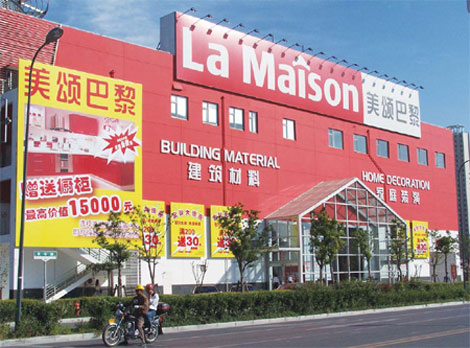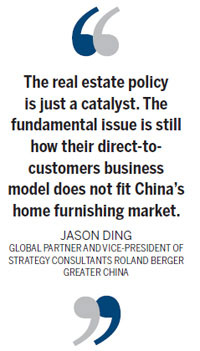Home improvers up against wall
Updated: 2011-03-25 10:42
By Yang Yang (China Daily European Weekly)
|
|||||||||
 |
|
The French group Saint-Gobain closed all its seven La Maison home decoration shops in Shanghai earlier this month. Provided to China Daily |
A number of leading home improvement retailers are facing growing challenges in China, with the increasingly complicated market forcing Fortune Global 500 company Saint-Gobain to shut down all its seven home decoration shops in Shanghai in the latest instance.
The French construction group said earlier this month that as "the evolution of the decoration market in China has moved more and more to pre-decoration, Saint-Gobain decided to close La Maison in Shanghai area", including the 8,000 square-meter flagship store and six design showrooms.
"The individual demand for interior settings is dwindling since more housing and apartments will be sold with interior decorations," says Nicolas Nie, external affairs director at Saint-Gobain China.
"Our business, which is based on individual demand, becomes increasingly difficult."
Saint-Gobain's move followed US DIY giant The Home Depot closing its last Beijing store in January, with operational difficulties cited as the reason. The US building material company has seven stores left in the country after closing five outlets since entering the market in 2006.
Home improvement giant B&Q, owned by Britain's Kingfisher, which came to China in 1999, also closed 22 of its 63 stores and reduced the area of another 17 stores in 2009.
 |
"Although the overall supply of home improvement products in China is very huge, the suppliers are generally small," he says.
The whole system including the supply chain, logistics and warehousing has not been developed fully, so big supermarket chains cannot achieve their advantages in lower costs, Nie says.
Nie also criticized the ill-regulated home improvement retail market. Some local retailers compete unfairly by selling fake commodities and evading taxes, he says.
The government's tightening policy on the real estate sector is another main cause of the businesses' difficulties, Nie says.
"Many of the 10 million affordable homes each year planned by the government will be sold with interior settings, so the market for high-end individual demand on interior decoration will shrink," Nie says.
Qian Zhanxue, vice-president of China Building Materials Circulation Association, says that the government's control of the property market has exerted great influence on home improvement retailing.
"The need for building materials is falling because people, even those needing houses to get married, are watching the property market instead of buying houses and decorating them. They expect housing prices to fall significantly," he says.
Jason Ding, partner and vice-president of Roland Berger Strategy Consultants Greater China, disagreed.
"The real estate policy is just a catalyst. The fundamental issue is still how their direct-to-customers business model does not fit China's home furnishing market," Ding says.
Unlike customers in North America and Europe who are used to going to DIY stores for home furnishings, Chinese buyers tend to use home furnishing companies because they are cheap. Most people only renovate once every several years and they often rely on these companies to make recommendations. The small vendors in the home furnishing market have very close relationships and profit-sharing agreements with these companies, Ding says.
But Ding says "B&Q and La Maision do not have this type of system so they failed badly. Although they had opened the physical stores, without the large network of home furnishing companies, it is useless".
Compared with consumers decades ago when foreign brands first entered China, Chinese people today no longer pursue foreign brands blindly, considering them to be always better than local brands, says Wang Zhile, director of the research center on transnational corporation under the Ministry of Commerce.
"The foreign companies' competitors have also evolved through the years. Many more foreign companies have come to China. Besides adjusting themselves to the Chinese market, they are also seriously challenged by strong local brands," he says.
B&Q, Home Depot and La Maison are facing strong domestic competitors, which are represented by Red Star Macalline International Furniture and Real Estate Chain, and Beijing Easyhome Investment Holding Group Co Ltd.
In 2010, Red Star Macalline, China's biggest home improvement retailer, opened about 80 shops around the country, with sales amounting to 36 billion yuan (3.87 billion euros). Easyhome, the second biggest, opened about 40 shops with estimated sales of 28 billion yuan. Both are trying to seek public listings.
Unlike their multinational rivals which profit through margins between purchasing and selling much like a supermarket's business mode, domestic companies make profits by renting their malls to different building material and furniture brands.
While the "supermarket" mode is considered to provide a better shopping environment, the domestic companies' method costs less. Its consumers can also get better prices by bargaining in shops, therefore fitting the Chinese market better, Wang Zhile says.
"B&Q's supermarket mode can indeed make profits through powerful management and capital support, but that does not fit the Chinese market," 21st Century Business Herald magazine quotes Che Jianxin, CEO of Red Star Macalline, as saying.
Retailers have to face high risks and need large amounts of money if they complete every step from purchasing and warehousing to sale and customer service. Apart from demanding management skills that cannot be acquired in a short term, China's home improvement chain is also still immature. Imitators will divide up the limited profits, Che told the magazine.
In 2010, the sales of home improvement products in the country hit 1.1 trillion yuan, up 22 percent, according to the China Building Materials Circulation Association.
The potential for enormous profits continue to attract brands from home and abroad.
"Although we closed La Maison, Saint-Gobain is developing well in China with sales increasing by 40 percent last year," Nie says. Saint-Gobain now owns more than 50 companies in the country since entering China in 1985, operating in a range of markets including flat glass, insulation, gypsum, building materials and distribution.
"China is our most important market since it is so big and growing so fast," Nie says.
"And we will make adjustments."











